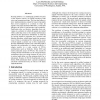Free Online Productivity Tools
i2Speak
i2Symbol
i2OCR
iTex2Img
iWeb2Print
iWeb2Shot
i2Type
iPdf2Split
iPdf2Merge
i2Bopomofo
i2Arabic
i2Style
i2Image
i2PDF
iLatex2Rtf
Sci2ools
141
Voted
FPGA
1995
ACM
1995
ACM
PathFinder: A Negotiation-based Performance-driven Router for FPGAs
Routing FPGAs is a challenging problem because of the relative scarcity of routing resources, both wires and connection points. This can lead either to slow implementations caused by long wiring paths that avoid congestion or a failure to route all signals. This paper presents PathFinder, a router that balances the goals of performance and routability. PathFinder uses an iterative algorithm that converges to a solution in which all signals are routed while achieving close to the optimal performance allowed by the placement. Routability is achieved by forcing signals to negotiate for a resource and thereby determine which signal needs the resource most. Delay is minimized by allowing the more critical signals a greater say in this negotiation. Because PathFinder requires only a directed graph to describe the architecture of routing resources, it adapts readily to a wide variety of FPGA architectures such as Triptych, Xilinx 3000 and mesh-connected arrays of FPGAs. The results of routin...
| Added | 26 Aug 2010 |
| Updated | 26 Aug 2010 |
| Type | Conference |
| Year | 1995 |
| Where | FPGA |
| Authors | Larry McMurchie, Carl Ebeling |
Comments (0)

